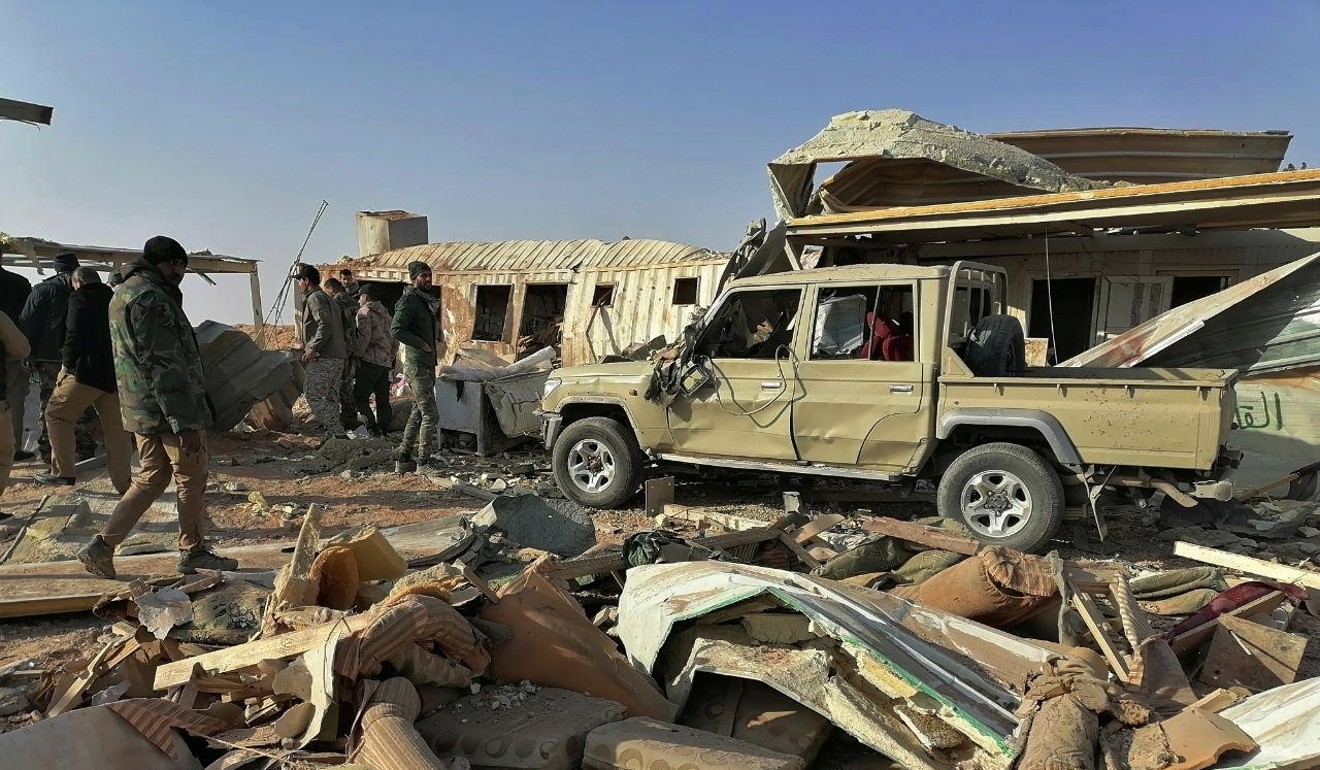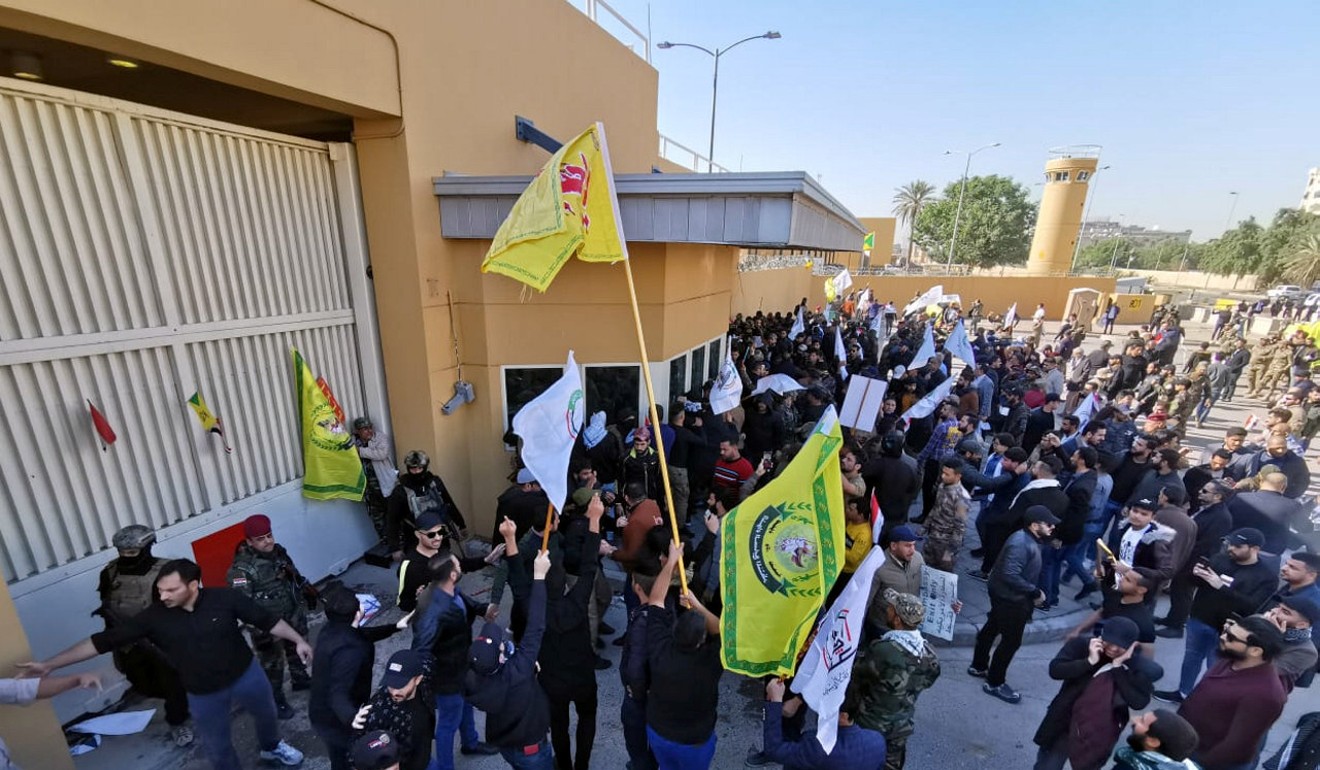
Donald Trump blames Iran as Iraqi protesters storm US embassy over air strikes
- Tear gas fired at demonstrators who attacked the embassy in anger over US offensive that killed 25 fighters
- Pentagon is sending extra troops to Baghdad to provide security for the embassy
“We expect Iraq to use its forces to protect the Embassy, and so notified!” Trump tweeted.
Iraqi supporters of pro-Iran factions attacked the embassy early Tuesday, breaching its outer wall and chanting “Death to America” in anger over weekend air strikes that killed two dozen fighters.
It was the first time in years that protesters have been able to reach the US embassy, which is sheltered behind a series of checkpoints in the high-security Green Zone.
“Now Iran is orchestrating an attack on the US Embassy in Iraq. They will be held fully responsible,” he tweeted.
A stream of men in military fatigues, as well as some women, marched through those checkpoints to the embassy walls with no apparent reaction from Iraqi security forces.
The demonstrators waved flags in support of the Hashed al-Shaabi, a mostly Shiite network of Iraqi armed groups that has received training and weapons from Iran.
US launches ‘defensive strikes’ in Iraq
They threw rocks and wrenched security cameras off the walls, ignoring calls over megaphones to leave the embassy compound.
In response, US marine guards fired an initial volley of bullets, then switched to tear gas to disperse the crowd.

The Hashed said at least 62 people were wounded.
Defence Secretary Mark Esper said on Tuesday that the Pentagon is sending extra troops to its embassy in Baghdad.
“The Department of Defence is working closely with the Department of State to ensure the security of our embassy and personnel in Baghdad,” Esper said in a statement.
“We are sending additional forces to support our personnel at the embassy.”
Caretaker prime minister Adel Abdel Mahdi said that the crowds that had stormed the US embassy should leave the compound “immediately.”
“We recall that any aggression or harassment of foreign embassies will be firmly prohibited by the security forces,” Abdel Mahdi’s office said.
In phone calls with both Abdel Mahdi and President Barham Saleh, Secretary of State Mike Pompeo “made clear the US will protect and defend its people, who are there to support a sovereign and independent Iraq,” the State Department said in a statement.
Both Abdel Mahdi and Saleh assured Pompeo “that they took seriously their responsibility for and would guarantee the safety and security of US personnel and property,” the statement said.
The demonstrators were protesting US air strikes that killed at least 25 fighters from a hardline Hashed faction known as Kataeb Hezbollah (Hezbollah Brigades) on Sunday. The Iraqi government had earlier announced three days of mourning for the militiamen killed in the offensive.
Thousands of Iraqis protest against Iran’s influence
Those strikes were in response to a 36-rocket attack last week that killed one US contractor at an Iraqi base, the latest in a string of attacks on areas where US troops are deployed.
They have not been claimed but US security assessments have largely blamed them on Kataeb Hezbollah.
The US has around 5,200 troops deployed across Iraq to train security forces and prevent any resurgence of Islamic State.
After the strikes, Kataeb Hezbollah and other pro-Iran factions in the Hashed demanded the “withdrawal of the American enemy”.
Protesters echoed those calls on Tuesday, carrying posters reading: “Parliament should oust US troops, or else we will.”
Others carried banners with Trump’s face crossed out.
They scrawled “No to America!” and “Soleimani is my commander” on the embassy walls, referring to Iran’s point man for Iraq, Revolutionary Guards commander Major General Qasem Soleimani.
Many set up tents to begin an indefinite sit-in.

US personnel at the embassy are safe and there are no plans to evacuate, the State Department said on Tuesday.
“Our first priority is the safety and security of US personnel,” a State Department spokesperson said in a statement.
“US personnel are secure and there has been no breach,” the spokesperson said. “There are no plans to evacuate Embassy Baghdad.”
The US ambassador to Iraq, Matt Tueller, who had been away on “personal travel,” was returning to the embassy, the spokesperson added.
Among those at the protests were Iraq’s National Security Adviser Faleh al-Fayyadh – who is also the head of the Hashed – and other top Hashed officials.
Iraq had long feared being caught in the middle of escalating tensions between its two main allies the US and Iran, after Washington pulled out of a landmark nuclear deal with Tehran last year.
Pompeo “underscored that attacks by the Iranian regime, or their proxies of any identity, that harm Americans, our allies, or our interests will be answered with a decisive response, as demonstrated yesterday.”

Iraq’s government, acting in a caretaker capacity after Abdel Mahdi resigned in the face of street protests, threatened to summon the US ambassador.
“American forces acted on their political priorities, not those of Iraqis,” it said.
Dozens of lawmakers called on the government to review an agreement allowing the deployment of US soldiers in the country, saying the strikes amount to a violation of sovereignty that renders the pact obsolete.
Abdel Mahdi said he had been forewarned by Defence Secretary Mark Esper that the US would carry out the strikes.
“He told me the United States would strike the Hezbollah Brigades and I told him it would be a very dangerous act that could lead to an escalation,” Abdel Mahdi said.
Additional reporting by Reuters

.png?itok=arIb17P0)